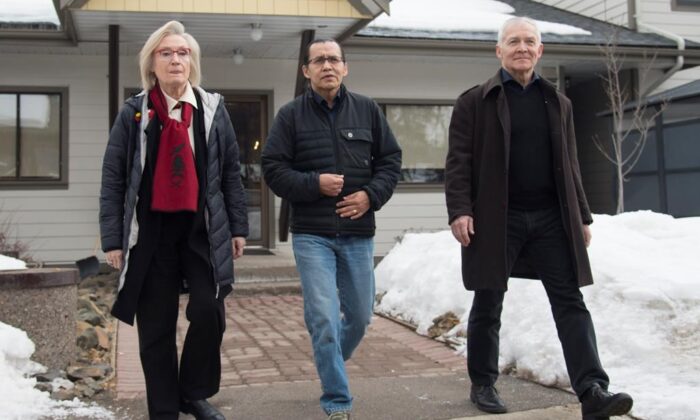Bank of America ‘Already Seeing Evidence’ of Coronavirus Economic Impact
SMITHERS, B.C.—Wet’suwet’en hereditary chiefs and senior government ministers reached a proposed arrangement Sunday following days of discussions over a pipeline dispute that prompted solidarity protests and transport disruptions across Canada in recent weeks.
Details of the draft deal, which centres on Indigenous rights and land titles, were not disclosed, however, and work on the Coastal GasLink natural gas pipeline at the heart of the dispute was set to resume Monday.
Federal Crown−Indigenous Relations Minister Carolyn Bennett and British Columbia Indigenous Relations Minister Scott Fraser said the talks have helped address the land rights and title of the Wet’suwet’en.
“We, I believe, have come to a proposed arrangement that will also honour the protocols of the Wet’suwet’en people and clans,” Bennett said in a news conference in Smithers, B.C.
“What we’ve worked on this weekend needs to go back to those clans and then we have agreed as ministers that we will come back to sign if it is agreed upon by the Nation.”
She said the proposed arrangement is about making sure “that this never happens again, that rights holders will always be at the table.”
Chief Woos, one of the Wet’suwet’en hereditary leaders who were opposed to the pipeline, said the draft deal represents an important milestone for everyone involved but noted more work needs to be done.
He also stressed that the hereditary chiefs who were against the project remain opposed to the pipeline in their traditional territory.
“We are going to be continuing to look at some more conversations with B.C. and of course with the proponent and further conversation with the RCMP out on the territory,” Woos said.
“It’s not over yet. We are just looking at more work in that area.”
Shortly after the proposed deal was announced, Coastal GasLink issued a statement saying it would resume construction activities in the Morice River area, which is near the Unist’ot’en Healing Centre, on Monday.
“Coastal GasLink appreciates that a path has been identified to address significant issues of Aboriginal Title and Rights of the Wet’suwet’en people while recognizing that Coastal GasLink is fully permitted and remains on track for a 2023 in−service date,” president David Pfeiffer said in the statement.
He added the company “remains committed to dialogue and engagement” with all Indigenous groups along its route, including the Wet’suwet’en hereditary chiefs. “We are encouraged by Chief Woos statement that he is open to dialogue and look forward to an opportunity to meet with the hereditary chiefs,” he said.
The company had agreed to pause construction during the talks between the hereditary chiefs and the ministers, which began Thursday.
RCMP had also pledged to cease patrols along the Morice West Forest Service Road during the discussions. The Mounties could not immediately be reached for comment Sunday.
The dispute over the pipeline has spurred solidarity protests that have disrupted passenger and freight train service over the last three weeks. Police recently moved to dismantle some of the blockades.
The Wet’suwet’en are governed by both a traditional hereditary chief system and elected band councils. A majority of its councils have approved the pipeline, but some of the Wet’suwet’en hereditary chiefs oppose it running through their traditional territory.
The dispute also involves other unsettled land rights and title issues, including who has the right to negotiate with governments and corporations, the fact that the land is not covered by a treaty and remains unceded, and a 1997 court case that recognized the hereditary chiefs’ authority and the exclusive right of the Wet’suwet’en peoples to the land but did not specify the boundaries.
Lawyer Peter Grant, who represented the Wet’suwet’en and neighbouring Gitxsan First Nation, said the proposal is not a treaty. “It’s a draft arrangement, but I think it’s very powerful,” he said.
This article is from the Internet:Wet’suwet’en Hereditary Chiefs, Feds Reach Draft Arrangement Over Pipeline
Enemy Is China, Experts Warn at the Annual Gathering of Conservatives
